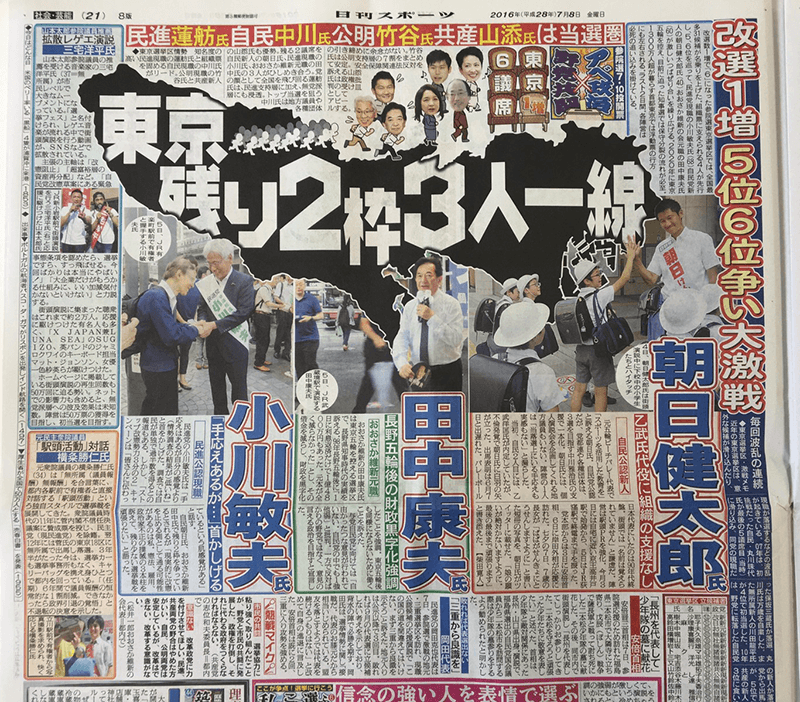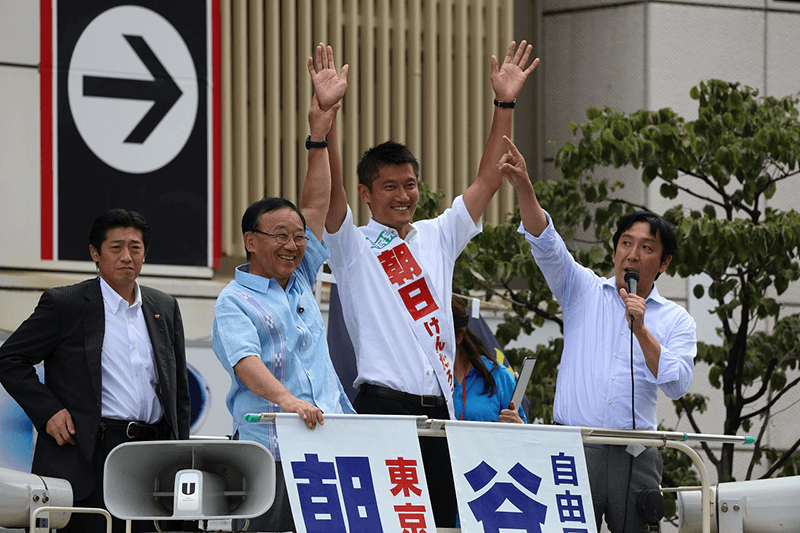A few of the issues at play in the Upper House election that will take place on Sunday.
Compared to blockbuster political stories like the recent Brexit referendum and the seemingly endless US presidential campaign, elections in Japan don’t draw much international attention. If you’re living here, you’ve probably seen the signboards around your neighborhood, walked by a candidate greeting passers-by at the train station, or heard the loudspeaker-amplified voices of candidates blaring out from vans and sound trucks. These scenes are being repeated around the country, and will be until elections are held on Sunday.
But what exactly is at stake?
This election is for members of the Upper House of Parliament (参議院, sangiin), a position which is held for six years. The Upper House is broken into two groups, and elections are held every three years. One hundred and twenty-one seats from the 242-seat body are up for grabs this time, and Prime Minister Shinzo Abe’s Liberal Democratic Party (LDP) is looking to further increase its majority in the House, potentially allowing it to rely less on its coalition with the Komeito.

According to this story in Nikkan Sports, Kentaro Asahi (center right) is in a three-man race in Tokyo, with two seats open. Can the former beach volleyball make the cut?
This, despite the fact that Abe’s administration is not very popular and the fundamental promises of Abenomics have not been met. Voter turnout is expected to be low, despite the fact that a strong win for the LDP could grant Abe the two-thirds majority that he needs in order to put a constitutional amendment before Parliament. Most likely to be up for amendment is Article 9, in which the country outlaws war as a means of resolving international disputes.
Although the LDP’s vice president, Masahiko Komura, has gone on record as saying that there is “zero possibility” that Abe would revise the fiercely contested Article 9 – even if the party were to amass the two-thirds majority. Other observers and political rivals believe that this possibility is a little higher than zero.
Another narrative is that several small parties find their political existence threatened in these elections. To continue their existence, a political party needs to have at least five seats in Parliament, or one seat in Parliament and to have gotten at least 2 percent of votes in the last two Upper House elections or the most recent House of Representatives election. Currently facing dissolution are the Social Democratic Party and the People’s Life Party; meanwhile, several more are on the bubble in years to come.
Turning Out the Youth Vote?
Getting younger people to vote is a challenge around the world, and in Japan, disinterest in politics is particularly high for the young. However, there are a couple of candidates with youth appeal who will be on the ballots in Tokyo.
One of them is the musician Yohei Miyake, who is running as an unaffiliated candidate. While he may not wield much political clout or be much of an influencer when it comes to mainstream politics, one area where he has been very successful is in his ability to draw massive crowds (see the video below) to his “Senkyo Fes” (Election Festival) events, which combine the energy of a live show with Miyake’s straightforward, no-nonsense discussion of social issues that are important to younger voters. Even if he may not be able to secure himself a seat in the Upper House, it will be heartening if the former rocker manages to make a strong showing at the polls.
Former beach volleyball star Kentaro Asahi (main image, center) is a newcomer on the political scene who has very good chances of winning a seat with the LDP. After retiring from the sport, Asahi started up a beach cleaning program NPO. In keeping with his athletic background, a major focus of his campaign is to inspire Japanese citizens to be more physically active and make sports a part of their daily life; he’s hoping to use enthusiasm about the 2020 Olympic Games to get the movement started, but hopes to establish social programs that will give the public easier access to daily fitness options.
A Lighter Note
Of course, there’s one other thing that appeals to the young (and young at heart), but it isn’t usually something that politicians want to be associated with. Yes, we’re talking about sex. Rather than running away from the issue, the sex products company Tenga is using it to younger potential voters fired up for this erection…er, election. According to Rocketnews24, Tenga is giving away disposable “devices” (and two condoms) to 100 lucky winners selected from people who tweet a picture of their “completion of voting certificate” with a specific hashtag. It’s certainly one way to get them to the polls.
Main Image: Kentaro Asahi on the campaign trail with LDP members Sadakazu Tanigaki (left) and Isshu Sugawara (right)









